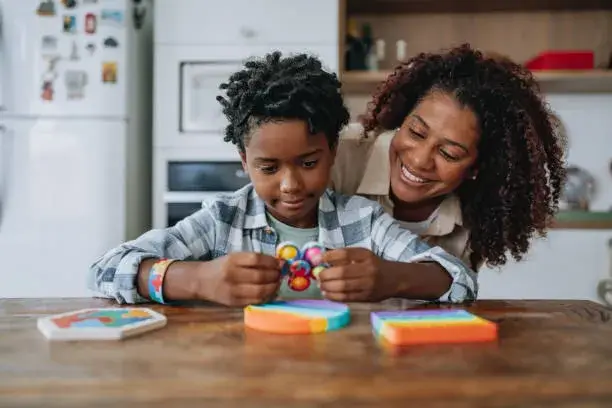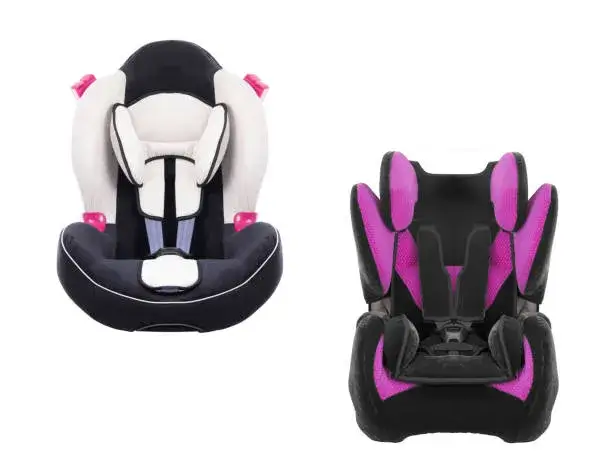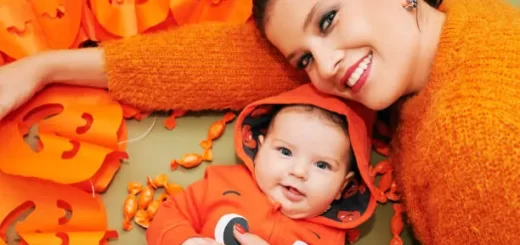Best Autism Spinning Toys for Sensory Fun in 2024
Autism is a complex neurological condition that affects individuals differently, with a range of symptoms that can include challenges with social interactions, communication difficulties, and repetitive behaviors. One of the common behaviors observed in individuals with autism is a fascination with spinning objects. This fascination can be both soothing and stimulating, making spinning toys an important tool in managing sensory needs. In this comprehensive guide, we will delve into the world of autism spinning toys, exploring their benefits, types, and the best options available on the market. Whether you’re a parent, caregiver, or educator, this guide will provide valuable insights into how these toys can support individuals with autism.
Understanding Autism and Sensory Processing

What is Autism?
Autism Spectrum Disorder (ASD) is a developmental disorder characterized by a range of symptoms that affect communication, behavior, and social interaction. The severity and combination of these symptoms can vary widely among individuals, making each case unique. Common signs of autism include:
- Difficulty with social interactions
- Challenges in communication
- Repetitive behaviors and routines
- Sensory sensitivities
Sensory Processing in Autism

Many individuals with autism have differences in sensory processing. This means they might be hypersensitive (over-responsive) or hyposensitive (under-responsive) to sensory stimuli. Sensory sensitivities can impact their daily lives, making it essential to find ways to help them regulate their sensory input. Autism spinning toys can play a crucial role in this aspect.
The Benefits of Autism Spinning Toys

Spinning toys are more than just fun; they offer several therapeutic benefits for individuals with autism. Here are some of the key advantages:
Sensory Regulation
Spinning toys provide sensory input that can help regulate the sensory system. For those who are sensory-seeking, the repetitive motion and visual stimulation can be calming and satisfying.
Focus and Attention
Engaging with spinning toys can improve focus and attention. The mesmerizing motion of the toys can help individuals concentrate and stay engaged in an activity for longer periods.
Stress Relief

The rhythmic and predictable movement of spinning toys can have a soothing effect, helping to reduce anxiety and stress. This can be particularly beneficial during transitions or in overwhelming environments.
Motor Skills Development
Using spinning toys can enhance fine motor skills and hand-eye coordination. Manipulating these toys requires precision and control, which can help develop these important skills.
Cognitive Development
Spinning toys can also support cognitive development by encouraging problem-solving, understanding cause and effect, and promoting visual tracking skills.
Types of Autism Spinning Toys
There is a wide variety of spinning toys available, each offering different sensory experiences and benefits. Here are some of the most popular types:
1. Fidget Spinners

Description: Fidget spinners are small, handheld devices that spin around a central bearing. They come in various designs and colors, making them visually appealing.
Benefits: Fidget spinners are great for on-the-go sensory input. They are portable, easy to use, and can help with focus and stress relief.
Examples: Tri-spinner fidget toys, LED light-up spinners.
2. Spinning Tops

Description: Spinning tops are classic toys that can be spun on a flat surface. They come in different shapes, sizes, and materials, from simple wooden tops to complex metal designs.
Benefits: Spinning tops offer visual stimulation and require fine motor skills to operate. They are great for promoting hand-eye coordination and concentration.
Examples: Wooden spinning tops, Beyblade tops.
3. Gyroscopes

Description: Gyroscopes are devices that demonstrate the principles of angular momentum. They spin rapidly and maintain their orientation, making them fascinating to watch and manipulate.
Benefits: Gyroscopes provide a unique sensory experience and can be educational. They are excellent for teaching concepts of physics and promoting curiosity.
Examples: Handheld gyroscopes, educational gyroscope kits.
4. Wind-Up Spinning Toys

Description: These toys are wound up using a key or mechanism, and then they spin rapidly until they wind down. They come in various designs, often with colorful and engaging visuals.
Benefits: Wind-up toys are great for developing fine motor skills and understanding cause and effect. They are also fun to watch and can keep individuals engaged.
Examples: Wind-up animals, wind-up cars.
5. Sensory Spinners

Description: Sensory spinners are designed specifically for sensory input. They often have additional features like textured surfaces, lights, or sounds.
Benefits: These toys provide multi-sensory stimulation, catering to various sensory needs. They are excellent for calming and focusing.
Examples: Light-up sensory spinners, textured handheld spinners.
Choosing the Best Autism Spinning Toys
When selecting spinning toys for individuals with autism, it’s important to consider several factors to ensure the toys are beneficial and enjoyable. Here are some key considerations:
Safety
Ensure the toys are made from non-toxic materials and do not have small parts that could be a choking hazard. Look for toys with smooth edges and durable construction.
Age Appropriateness
Choose toys that are suitable for the individual’s age and developmental level. Some spinning toys may be too complex for younger children, while others might not provide enough stimulation for older individuals.
Sensory Needs
Consider the specific sensory needs of the individual. If they are visually stimulated, choose toys with vibrant colors and lights. For tactile seekers, opt for toys with textured surfaces.
Portability
If the toy will be used on the go, select portable options that are easy to carry and use in various settings.
Engagement
Look for toys that will keep the individual engaged and interested. Variety in design and functionality can help maintain interest over time.
Top 20 Autism Spinning Toys
Here are some of the best autism spinning toys available on the market, chosen for their quality, sensory benefits, and overall appeal:
1. Dino Spinner

Description: A colorful, dinosaur-themed fidget spinner with LED lights.
Benefits: Provides visual and tactile stimulation, portable and engaging.
2. Classic Wooden Spinning Top

Description: A beautifully crafted wooden top with intricate designs.
Benefits: Encourages fine motor skills and visual tracking.
3. Gyroscope Kit

Description: An educational gyroscope that demonstrates physics principles.
Benefits: Promotes curiosity and understanding of scientific concepts.
4. Wind-Up Ladybug

Description: A charming wind-up toy that spins around playfully.
Benefits: Develops fine motor skills and provides visual stimulation.
5. Textured Sensory Spinner

Description: A handheld spinner with textured surfaces and LED lights.
Benefits: Offers multi-sensory input, including visual, tactile, and auditory stimulation.
6. Beyblade Burst

Description: A competitive spinning top game with customizable tops.
Benefits: Encourages social interaction, hand-eye coordination, and strategic thinking.
7. LED Fidget Spinner

Description: A fidget spinner with vibrant LED lights that change colors.
Benefits: Provides visual stimulation and helps with focus and stress relief.
8. Handheld Gyroscope

Description: A compact gyroscope that demonstrates angular momentum.
Benefits: Fascinating to watch and manipulate, educational and fun.
9. Sensory Spinning Light Globe

Description: A globe that lights up and spins, providing visual and tactile input.
Benefits: Engaging and calming, great for visual stimulation.
10. Wind-Up Robot

Description: A wind-up toy robot that spins and moves around.
Benefits: Encourages fine motor skills and understanding of cause and effect.
11. Giant Spinning Top

Description: A large, colorful spinning top that spins for an extended time.
Benefits: Provides long-lasting visual stimulation and fun.
12. Spinner Ring

Description: A ring with a spinning component, ideal for discreet sensory input.
Benefits: Portable and subtle, helps with focus and stress relief.
13. Spinning Glow Ball

Description: A ball that lights up and spins when rolled.
Benefits: Combines visual and tactile stimulation, encourages movement.
14. Magnetic Gyro Wheel

Description: A wheel that spins along a magnetic track.
Benefits: Engages fine motor skills and visual tracking, educational.
15. Light-Up Spinner Wand

Description: A wand with a spinning light-up top.
Benefits: Provides visual stimulation and is fun to manipulate.
16. Spinning Drum

Description: A handheld drum that spins and creates rhythmic sounds.
Benefits: Combines auditory and visual stimulation, promotes rhythm and coordination.
17. Twist and Spin Fidget

Description: A fidget toy that twists and spins, offering multiple sensory inputs.
Benefits: Great for tactile and visual stimulation, helps with focus.
18. Sensory Marble Spinner

Description: A spinner with colorful marbles that move and spin.
Benefits: Engaging visual and tactile input, soothing and satisfying.
19. Rainbow Spinner

Description: A spinner with rainbow colors that create mesmerizing patterns.
Benefits: Provides visual stimulation and helps with relaxation.
20. Interactive Spinning Globe

Description: A globe that spins and lights up, with interactive features.
Benefits: Educational and engaging, combines visual and tactile input.
How to Use Autism Spinning Toys Effectively

To get the most benefit from autism spinning toys, it’s important to use them effectively. Here are some tips for incorporating these toys into daily routines:
Create a Sensory-Friendly Environment
Set up a sensory-friendly space where individuals can use spinning toys without distractions. This can be a quiet corner with comfortable seating and minimal visual clutter.
Use During Transition Times
Transitions can be challenging for individuals with autism. Using spinning toys during transitions can provide a calming activity that helps ease the process.
Incorporate into Sensory Breaks

Schedule regular sensory breaks throughout the day where individuals can use spinning toys to regulate their sensory input. This can help prevent sensory overload and improve focus.
Encourage Social Interaction
Spinning toys can be a great way to encourage social interaction. Use them in group settings or playdates to promote sharing and cooperative play.
Combine with Other Sensory Tools
For a well-rounded sensory experience, combine spinning toys with other sensory tools like weighted blankets, chewable jewelry, or sensory bins.
Autism Spinning Toys for Different Age Groups

Choosing the right spinning toy depends on the age and developmental stage of the individual. Here are some recommendations for different age groups:
Toddlers (1-3 years)
For toddlers, choose spinning toys that are safe, durable, and easy to manipulate. Look for larger toys with bright colors and simple mechanisms.
Examples: Large wooden spinning tops, wind-up toys with simple designs.
Preschoolers (3-5 years)
Preschoolers can handle more complex toys that require some coordination. Look for engaging toys that promote fine motor skills and visual tracking.
Examples: Fidget spinners, sensory spinners with lights and textures.
School-Age Children (6-12 years)

School-age children can enjoy a wide range of spinning toys, including educational and interactive options. Choose toys that are challenging and promote cognitive development.
Examples: Gyroscopes, Beyblade tops, interactive spinning globes.
Teenagers and Adults (13+ years)
Teenagers and adults may prefer discreet and portable options that can be used in various settings. Look for toys that offer subtle sensory input and are socially appropriate.
Examples: Spinner rings, handheld gyroscopes, portable fidget spinners.
DIY Autism Spinning Toys

Creating DIY spinning toys can be a fun and cost-effective way to provide sensory input. Here are some simple ideas for making your own spinning toys at home:
Paper Pinwheels
Materials: Colorful paper, push pins, wooden sticks.
Instructions:
- Cut the paper into a square.
- Fold the square diagonally to form a triangle, then unfold.
- Cut along the diagonal lines, stopping about an inch from the center.
- Fold every other corner towards the center and secure with a push pin.
- Attach the pinwheel to a wooden stick and enjoy spinning.
Bottle Cap Spinners
Materials: Plastic bottle caps, hot glue, small beads, paper clips.
Instructions:
- Glue two bottle caps together, bottom to bottom.
- Insert a bead inside each cap to act as a spacer.
- Straighten a paper clip and insert it through the center of the caps.
- Bend the ends of the paper clip to secure the spinner.
- Spin and enjoy!
Cardboard Gyroscope
Materials: Cardboard, scissors, glue, string.
Instructions:
- Cut two identical circles from the cardboard.
- Glue the circles together with a small gap in the center.
- Poke a hole through the center and thread a string through.
- Hold the ends of the string and spin the gyroscope to see it in action.
Conclusion

Autism spinning toys are valuable tools for individuals with autism, offering sensory regulation, stress relief, and developmental benefits. With a wide variety of options available, it’s easy to find the perfect toy to meet individual needs and preferences. Whether you’re looking for fidget spinners, spinning tops, or DIY options, these toys can make a significant positive impact on the lives of those with autism. By understanding the benefits and choosing the right toys, you can provide engaging and therapeutic sensory experiences that support growth and well-being.
Note: This post contains Amazon affiliate links. If you make a purchase through these links, I may receive a small commission at no extra cost to you.











